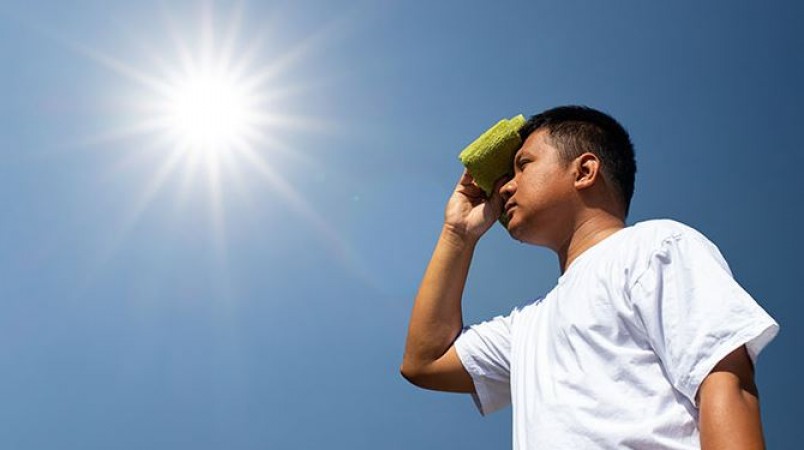
As the temperature rises during the summer season, not only does the external temperature increase, but the internal temperature of the body also rises. For individuals consuming spicy or oily foods during this season, the hot weather can lead to considerable discomfort. Prolonged exposure to the sun also increases the risk of heatstroke, a medical emergency commonly known as heat injury.
According to experts, heat injury occurs when the body remains in contact with the sun for extended periods, causing it to become excessively warm. This can significantly increase the risk of dizziness or dehydration. However, preparation should be in place beforehand to mitigate these risks. Let's delve into expert advice.
Avoid Unnecessary Sun Exposure:
When the sun's intensity peaks during the summer, limiting exposure is crucial. Prolonged exposure to direct sunlight increases the risk of heatstroke. It's advisable to plan outdoor activities during cooler times of the day, such as early morning or late evening. If being outdoors during peak hours is unavoidable, seek shade whenever possible, whether it's under trees, umbrellas, or canopies.
Use protective gear such as sunglasses with UV protection to shield your eyes from harmful rays. Additionally, wearing a wide-brimmed hat or cap can provide shade and prevent overheating of the head.
Stay Hydrated:
Dehydration is a significant risk factor for heatstroke. As the body sweats to cool down in hot weather, it loses fluids and electrolytes. To prevent dehydration, it's essential to drink an adequate amount of water throughout the day, even if you're not feeling thirsty. Carry a reusable water bottle and sip water frequently, aiming for at least eight glasses (64 ounces) of water daily.
In addition to water, consuming electrolyte-rich beverages such as sports drinks or coconut water can help replenish lost electrolytes and maintain hydration levels. Avoid excessive consumption of caffeinated or alcoholic beverages, as they can contribute to dehydration.
Wear Appropriate Clothing:
Choosing the right clothing can help regulate body temperature and prevent overheating. Opt for loose-fitting, lightweight, and breathable fabrics such as cotton or linen, which allow air circulation and promote sweat evaporation. Dark-colored clothing absorbs more heat, so wearing light-colored clothes can help reflect sunlight and keep you cooler.
Consider wearing moisture-wicking clothing designed specifically for hot weather, as these fabrics draw sweat away from the skin and facilitate evaporation, keeping you dry and comfortable. Additionally, wearing a wide-brimmed hat or visor can provide shade and protect your face and neck from direct sunlight.
Take Regular Breaks and Rest Indoors:
When engaging in outdoor activities during hot weather, it's essential to take frequent breaks and rest in shaded or air-conditioned areas. Overexertion in high temperatures can increase the risk of heat exhaustion or heatstroke. Listen to your body's signals and take breaks whenever you feel fatigued, dizzy, or overheated.
Plan outdoor activities during the cooler parts of the day, such as early morning or late evening, to minimize exposure to the sun's peak intensity. If possible, schedule strenuous activities for indoor venues with air conditioning to avoid overheating.
Know the Signs and Symptoms of Heatstroke:
Recognizing the early signs of heatstroke is crucial for prompt intervention and treatment. Common symptoms include high body temperature (above 104°F or 40°C), rapid heartbeat, headache, nausea, vomiting, dizziness, confusion, and loss of consciousness.
If you or someone else experiences symptoms of heatstroke, it's essential to take immediate action. Move to a cooler environment, such as an air-conditioned room or shaded area, and remove excess clothing. Hydrate by drinking cool water or sports drinks, and apply cold compresses to the skin to lower body temperature.
Seek medical attention promptly if symptoms persist or worsen, as untreated heatstroke can lead to serious complications, including organ damage or failure.
Modify Your Exercise Routine:
During hot weather, it's important to adjust your exercise routine to minimize the risk of heat-related illnesses. Choose cooler times of the day, such as early morning or late evening, for outdoor workouts. If exercising outdoors, avoid high-intensity activities and opt for lower-impact exercises such as walking, swimming, or yoga.
Pay attention to your body's signals and pace yourself accordingly. If you start to feel overheated or fatigued, take a break and hydrate. Consider indoor alternatives such as gym workouts, indoor swimming, or exercise classes with air conditioning.
Monitor Vulnerable Populations:
Certain populations are at higher risk of heat-related illnesses, including older adults, young children, individuals with chronic medical conditions, and those taking certain medications. It's essential to monitor these vulnerable groups closely during hot weather and take additional precautions to prevent heatstroke.
Ensure that older adults and individuals with chronic conditions have access to cool environments and adequate hydration. Keep young children well-hydrated and limit their outdoor activities during peak heat hours. Check on elderly neighbors or relatives to ensure they are coping with the heat and offer assistance if needed.
Educate Yourself and Others:
Increasing awareness about the risks of heatstroke and the importance of prevention is key to reducing its incidence. Educate yourself and others about the signs and symptoms of heatstroke, as well as preventive measures to stay safe during hot weather.
Share information with family, friends, and community members about the importance of staying hydrated, seeking shade, and avoiding prolonged exposure to the sun. Encourage everyone to take proactive steps to prevent heat-related illnesses and support each other during periods of extreme heat.
In conclusion, it's essential to be mindful of the risks associated with excessive heat during the summer months. By following these expert recommendations, individuals can reduce the likelihood of heat injuries and enjoy a safer and healthier summer season.
These things offered to Maa Durga are a boon for health
World Voice Day: What Is the Quest for Vocal Wellness?
Be careful if you eat white bread for breakfast, know its disadvantages before eating